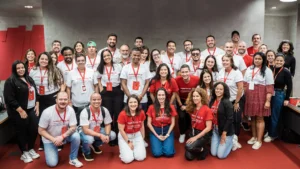Per André Borges, head of sustainable solutions at iFood
Article published in the newspaper O Tempo – Link
The sustainability agenda in the corporate environment is becoming increasingly urgent. More than recycling, we need to preserve and regenerate the environment. Only between 2020 and 2021, were 21,642 hectares of the Atlantic Forest were devastated, which is equivalent to more than 20 thousand football fields and represents an increase of 66% compared to the period between 2019 and 2020.
The data comes from the SOS Mata Atlântica Foundation in partnership with the National Institute for Space Research (Inpe). Another alarming fact is that only 12.4% of the forest that originally existed remains. Biome that covers around 15% of the national territory and concentrates 70% of Brazil's Gross Domestic Product (GDP).
To change this scenario, there is a long way to go. There is still a long way to go to reduce environmental impacts. And this problem is not just for the authorities, but also for society, institutions and private initiatives. After all, the benefit is for everyone. We must act as agents of transformation together.
In society, for example, it is possible to apply the 5 Rs policy, which proposes a change in consumption behavior and the way of dealing with the waste generated. The 5 Rs consist of five guiding principles: rethink, refuse, reduce, reuse and recycle. In this case, I would still dare to include another important “R”, reforestation. It is interesting to incorporate the habit of cultivating home gardens or gardening into our lives.
In private initiatives, the range of opportunities is even greater. To help restore the forest, for example, we opened a space in the iFood app to collect donations, which are used to plant native trees in partnership with Fundação SOS Mata Atlântica.
As a result, in March this year, the partners began planting 50,000 seedlings in the cities of Porto Feliz and Marabá Paulista (SP), which represents an area similar to that of 20 football fields and can remove up to 8,300 tons of CO2. of the atmosphere in 20 years — the equivalent of 28 million delivery deliveries.
In addition to joining important institutions in the sector, there are other initiatives that companies can incorporate to reduce environmental impacts, such as reducing the use of plastic. For a year now, we have offered customers in the app the option to opt out of having restaurants send cutlery, cups, straws and other plastic items.
Adoption was immediate: 94% of people responded that they would prefer not to receive plastic cutlery and straws. The impact of the action was more than 165 million orders made without single-use plastic items – which is equivalent to around 1,000 tons less plastic per day. But the mission continues. Now, the goal is to end plastic pollution in delivery by 2025.
In the political sphere, new paths are being charted. Carbon market regulation discussions can create important foundations for greener businesses.
For a long time, companies and institutions were not concerned with measuring and neutralizing the greenhouse gases (GHG) they emit into the atmosphere. With regulation, this scenario changes. In this context, the carbon credit market also allows companies that reduce their emissions to sell these assets to other companies and countries that have not reached their stipulated reduction targets.
Therefore, the message is simple: not only on National Atlantic Forest Day, but every day of the year, there is always room to become agents of transformation in favor of the environment.


